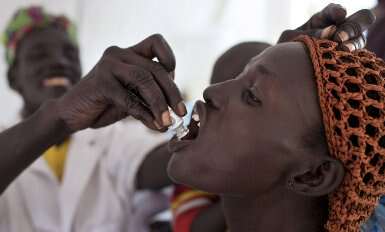South Sudan’s Upper Nile hit by cholera outbreak
July 11, 2014 (JUBA) – Residents in South Sudan’s border state of Upper Nile have been urged to take precautionary measures against the outbreak of cholera amid reports 100 people have been infected.

“Cholera has and is still ravaging the rural areas neighbouring Sudan, pointing out the need for active surveillance for the state health authority to avoid such disaster,” he said.
“If people are adequately enlightened about prevention and management of any situation, whenever an emergency occurs, its impact will not be of [such a] large proportion,” he added.
He said people in the rural areas needed education on the dangers of the disease and what steps can be taken to minimise the risk.
The committee, he said, would also work to promote greater cooperation between local governments and committees and health partners in order to implement better monitoring and reporting systems in communities.
“The purpose of the committee is to help local population get a clear understanding of the significance of health education as part of the precautionary measures to prevent the spread of cholera,” he said, adding the committee would also be responsible for mapping out strategies for an emergency response.
Amon identified Pashoda county as one of the most hard-hit areas, confirming that a number of people had died as a result of the disease, citing contaminated water as a leading cause of the outbreak.
“The reports we are receiving from county health departments are alarming. There are reports indicating loss of lives in some places. This is caused due to [a] lack of clean drinking water and you know these places are rural areas where people continue to fetch from streams and unprotected wells. Water from these water sources is not clean,” Amon said.
Amon said his ministry was urging locals to boil water from unprotected sources before using it.
“Water collected from unprotected sources is the cause of concern to us and we have now asked our people to take the health messages given to them by the health personnel in those areas,” he said.
He says local organisations were coordinating with international health partners like Medecins Sans Frontieres (MSF), WHO and UNICEF to respond to the cholera outbreak in affected areas.
However, Amon said details were still being collated and the number of casualties across the state was not yet known.
“Information we are getting now indicates that a lot of people have been affected and this could rise above [one] hundred. We have asked for support from the national ministry of health and from our health partners. So far MSF is taking the lead in treating patients,” he said.
The number of the people affected by the outbreak nationally also remains unclear, although reports from the United Nations indicate that up to 2,916 cases were reported as of 6 July, with 67 deaths confirmed so far.
The cholera outbreak was first reported in the capital, Juba, in May before spreading to other states.
Cholera is a highly infectious bacterial disease spread through contaminated water. Symptoms include severe diarrhoea, leading to dehydration and death if left untreated.
(ST)
